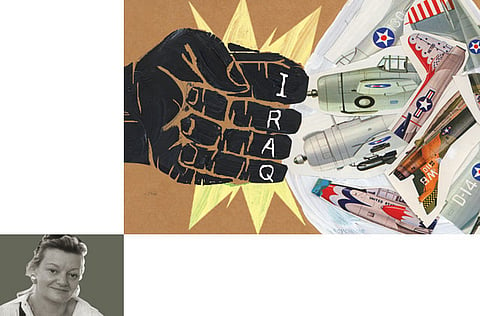Iraq must keep US trainers out
The people should try to resolve their own problems and realise that America operates according to its own interests

The Iraqi government has agreed to institute talks with the US on allowing between 10,000-15,000 US troops (benignly referred to as ‘trainers') to remain in the country for two years past the 2011 deadline for the American military withdrawal. The idea that Iraqi politicians, who are supposed to be patriots, would even consider permitting foreign occupiers to stay on a minute longer than necessary is shocking and begs certain questions.
Either the government has no real choice in the matter or it's a Vichy-style regime that is collaborating with Washington to promote America's geo-strategic interests above the wishes of the Iraqi people. Given that several members of the cabinet have close ties with Tehran, including Prime Minister Nouri Al Maliki who lived there for eight years, I would imagine that Iraq's leadership has little say in the matter.
Either way, the government is not fit for the purpose. If it isn't in a position to refuse the deal, it should admit its own impotency and quit fooling the Iraqi people that the country is free and democratic or that the occupation is about to end. Simply asserting that the Iraqi Army requires further training doesn't wash. Its brigades may not be the most experienced or efficient in the world but that's only because the Bush administration disbanded Saddam's military leaving armed and angry former soldiers without income in its wake.
But let's suppose for the sake of argument that the Iraqi Army does require outside help. Surely, a small contingent of UN-backed multi-national peacekeepers contracted to remain for a fixed term would be a better option — and one that ordinary Iraqis could accept. Moreover, much of the ongoing violence in Iraq is due to the continued American presence which is like a red rag for extremist groups. In any case, I don't buy this. I believe one of the reasons the Obama administration wants to keep its foot in the door is to ensure that this oil-rich country remains within the US sphere of influence by blocking Iran from stepping in.
Earlier this month, the Iraqi Oil Minister Abdul Kareem Luaibi met with the Iranian President Mahmoud Ahmadinejad before announcing, "The Iranian and Iraqi nations have common interests and enemies, based on which they should expand their cooperation." As far as I can see, the only enemies Tehran and Baghdad might have in common are ‘the Great Satan' and its ‘Little Satan' sibling.
Platter of lies
The idea of this once proud Arab nation getting cosy with Iran and perhaps even forming a political bloc may be unpalatable for the Arab world and rightly so. But a US troop presence beyond the end of this year similarly leaves a bitter taste. If George W. Bush and his neoconservative cohorts hadn't sidelined the Sunni military and civilian personnel while introducing a sham democracy, there wouldn't be as many pro-Iranian Iraqis in power today. There's an overwhelming moral imperative here. Just as a criminal shouldn't be allowed to profit from his crimes, America and its former coalition allies should not be permitted to benefit from theirs. Indeed, Britain's Chilcot Inquiry into the Iraq War is set to confirm what many had already deduced: that the invasion was sold to the public on a platter of lies.
It's believed that the report scheduled to be published later this year will criticise Britain's former PM Tony Blair for making a secret pledge with Bush to go to war in 2002, failing to apprise his ‘sofa government', exaggerating intelligence on Saddam's weapons of mass destruction — and failing to plan for the day after.
If I were an Iraqi I would want to see American soldiers and contractors (mercenaries) kicked out of my homeland to the last man along with US companies that received no-bid construction contracts via crony connections. Why would I agree to the very people responsible for the deaths of up to one million of my compatriots lording over the population in armoured personnel carriers with absolute immunity from prosecution? Why would I accept US corporations growing fat when Iraqi companies could do a better job as they did subsequent to the 1991 Gulf War when electricity and water supplies were swiftly brought back on tap?
Shiite leader Moqtada Al Sadr isn't afraid to speak his mind. "A government that accepts the existence of American forces in Iraq, even for training purposes, is a weak government," he said on Saturday while warning that US ‘trainers' would be considered as occupiers to be militarily resisted, if they were to stay on. It's likely that the majority of Iraqis agree with him but, unfortunately, although the US government conducts polls within Iraq, these are rarely published, probably because they indicate Iraqis want to see US forces out.
Yes, Iraq will face security problems once the occupier has gone. Yes, there will no doubt be violent sectarian clashes especially in the area of Kirkuk, home to Iraq's largest oil reserves, where ethnic tension between Kurds and Sunnis is high. But those problems will have to be faced and sorted out sooner or later by Iraqis themselves. America is no nanny; it operates according to its own interests. It's time for post-Saddam Iraq to grow up, kick out the enemy within and let the chips fall where they may.
Linda S. Heard is a specialist writer on Middle East affairs. She can be contacted at lheard@gulfnews.com Some of the comments may be considered for publication.


